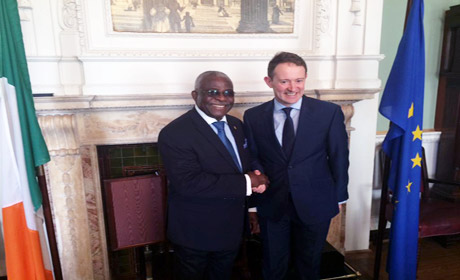Leading global policy makers visit Ireland to discuss hunger and agriculture
25/3/15
Minister Seán Sherlock met with the President of IFAD, Kanayo Mwanze, to discuss Ireland's role in addressing hunger and rural poverty.
Leading global policy-makers visit Ireland to discuss hunger and agriculture
Ireland hosted the world’s leading policy-makers on global hunger, agriculture, and food policy this week, with a visit from the Executive Director of the World Food Programme (WFP), Ertharin Cousin, and the President of the International Fund for Agriculture Development, Kanayo Nwanze.
The visits provided an excellent opportunity for Ireland to influence global policy debates, and to highlight the particular contribution Ireland makes to the global hunger and agriculture agendas.
At meetings with the WFD Director, Minister Charlie Flanagan and Minister Seán Sherlock discussed the most pressing humanitarian crises facing the world today. These included the Ebola epidemic, the South Sudan refugee crisis, and the ongoing conflict in Syria. The meetings also allowed for consideration of Ireland’s role in responding to these crises, through Irish Aid funding, Ireland’s Rapid Response Initiative, and Ireland’s central role in the post-2015 development agenda.
The visits coincide with the announcement of €1.5 million in Irish Aid funding to the World Food Programme, to meet the urgent needs of civilians affected by the Syria crisis.
In discussion with the IFAD President, Minister Sherlock highlighted Ireland’s long-standing commitment to smallholder farmers in the Irish Aid programme. This week’s negotiations on the Sustainable Development Goals were noted, as well as Ireland’s participation on the Exective Board of IFAD from 2015 to 2017. Mr Nwanze also delivered a lecture as part of the Irish Aid-IIEA Development Matters series, which focused on the inequality across the rural-urban divide.
The visits coincided with the announcement of €1.5 million in Irish Aid funding to the World Food Programme, to meet the urgent needs of civilians affected by the Syria crisis. The funding will provide vital food assistance such as food parcel for families, school meals for children, and nutrition support for pregnant and nursing mothers. Food production has dramatically declined throughout the Syrian conflict, with widespread violence severely affecting the agricultural sector.

